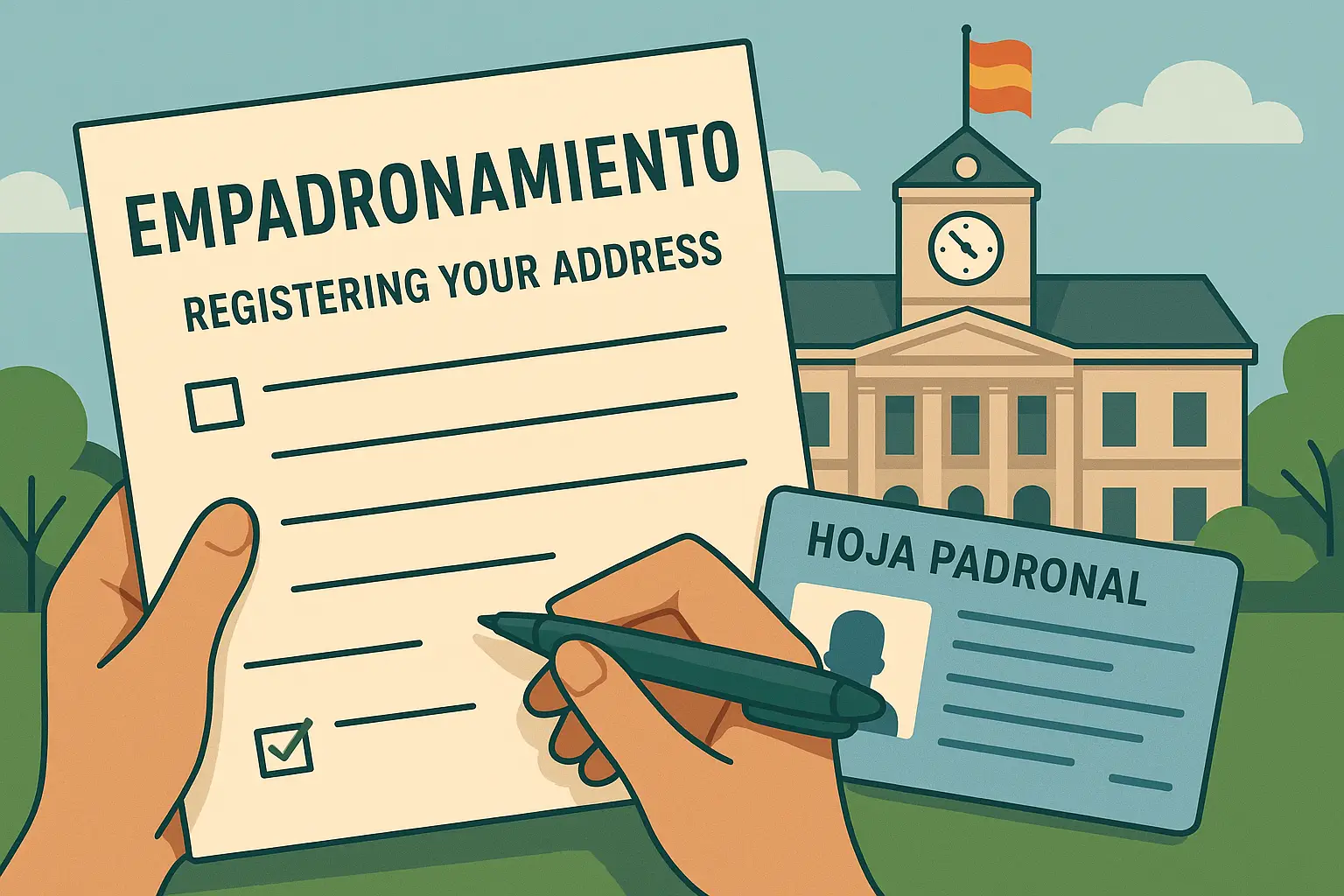Empadronamiento in Spain: What It Is, Why It Matters, and How to Register

Empadronamiento is the official registration of your address with the local town hall (Ayuntamiento) in Spain. Required under Article 15 of Law 7/1985, it's essential for accessing some public services, applying for residency, and proving your stay. Whether you're a citizen, temporary resident, or undocumented migrant, this guide shows how to register-step by step.
Key Takeaways
- Empadronamiento is legally required for anyone living in Spain more than 183 days per year.
- Registration is done at the Ayuntamiento (or Town Hall) of your actual place of residence.
- Non-EU residents without long-term permits must renew their registration every 2 years (per RDL 6/2023).
- You can register even without a lease by using authorization from a resident or social services assistance.
- The process is free, and the 'hoja padronal' is the required form to initiate it.
Get your personalized relocation checklist, step-by-step guidance, and access to our complete immigration app.
What Is Empadronamiento and Why Is It Important?
Empadronamiento is the process of registering and being listed in the municipal register (padrón municipal) of your place of residence. It's regulated by Law 7/1985, RD 1690/1986, and clarified by the Resolution of 29 April 2020. Registration is a MUST and is also necessary for:
-
Applying for or renewing your TIE (Foreigner’s Identity Card)
-
Accessing public healthcare and education
-
Proving residence for arraigo, permanent residency, citizenship, or driver’s license validation
-
Enrolling in the municipal registry of unmarried couples
Legal Obligation to Register for Empadronamiento
Article 15 of Law 7/1985 requires all residents in Spain to register in the municipality where they reside the longest part of the year. This applies to:
- Spanish nationals
- EU citizens
- Non-EU citizens (with or without legal status)
The padrón is purely administrative. It does not change your immigration status.
Who Can Register for Empadronamiento?
Anyone living in Spain for more than 6 months (more than 183 days to be exact) annually must register. This includes:
- Citizens and legal residents
- Students and temporary workers
- Undocumented migrants (yes, you can and should register)
This is confirmed in official INE instructions from 2020.
What Documents Do You Need for Empadronamiento registration?
You’ll need the following:
- Valid ID (passport, NIE, or TIE)
- Proof of address, such as:
- Rental contract with your information included
- Utility (water, electricity, gas or internet) bill in your name
- Property deed (for owners)
- Authorization letter and ID from the main resident (if you're not the leaseholder)
- Hoja padronal (the registration form from your Ayuntamiento which you can find online on the town hall website)
How to Register: Step-by-Step
- Book an appointment with your local Ayuntamiento (online or by calling 010).
- Gather your documents: ID, proof of address, hoja padronal.
- Attend the appointment, sign the form, and present your documents.
- Request your certificado de empadronamiento or volante.
In some towns, the certificate is issued immediately. Others may send it by post or email.
What Is the Validity of the Empadronamiento and When Should You Renew?
For most people, empadronamiento does not expire unless you change your address. However, under RDL 6/2023, non-EU nationals without long-term residency must renew their registration every 2 years. If not renewed, you may be automatically removed from the municipal register without prior notice. Local authorities are required to notify affected individuals 3 months in advance.
🔄 How to Renew Empadronamiento:
Renewal methods vary by city and depend on whether your details have changed. Common options include:
- Online: Available if your personal data or address hasn't changed and you have a digital certificate (Certificado Digital), electronic DNI (DNIe), or Cl@ve.
- In person: You can always renew by visiting your local town hall. Appointments are usually required.
- By phone: Some municipalities allow renewal or certificate requests by calling the local citizen service line (often 010).
🏙️ City Examples
| City | Renewal Methods |
|---|---|
| Madrid | Online via sede.madrid.es↗ using Cl@ve or Certificado Digital |
| Barcelona | Online via seuelectronica↗ or by appointment |
| Valencia | Online via sede.valencia.es↗ or in person with appointment |
| Sevilla | Appointment-based in-person renewal via sevilla.org↗ |
| Zaragoza | Book online via zaragoza.es↗; phone service available in some cases |
| Málaga | Online, phone, or in person via sede.malaga.eu↗ depending on your case |
💡 Always check your local Ayuntamiento’s website for updated procedures and eligibility.
What’s the Difference Between Empadronamiento and the Hoja Padronal?
Empadronamiento refers to the act of registering as a resident in Spain. The hoja padronal is the form used to apply. Once the form is submitted and approved, you’ll receive a certificate confirming your registration.
Volante vs Certificado de Empadronamiento
- Volante: A basic summary for general use.
- Certificado: A legally valid document used for immigration, schooling, social services, or pareja de hecho registration.
Ask for the certificado if you're using it for official procedures.
What If You’re Not on the Lease?
You can still register. Ask the leaseholder or homeowner for:
- A signed authorization letter (Ayuntamiento usually provides a template)
- A copy of their ID
- A recent bill showing they reside there
Attending the appointment together is often helpful.
What If You Don’t Have a Fixed Address?
You're still entitled to register. In these cases:
- Social services can verify that you habitually reside in the area.
- They’ll issue a report and indicate a valid address (even if informal).
- That address must be usable for official communications.
This is authorized under INE Resolution 29 April 2020.
What If the Landlord Refuses to Let You Register?
If you live there legally, you can register. The padrón is not a property or tax registry and doesn’t affect the owner.
If the landlord still refuses:
- Explain the law and your right to register
- Get help from social services or present alternative evidence (e.g. postal mail, witness declaration)
What Is the Certificate of Convivencia?
The certificado de convivencia proves that two or more people live together at the same address. It’s often required for:
- Registering as a pareja de hecho (unmarried couple)
- Enrolling children in school
- Proving family units for social aid
Some town halls may require two non-family witnesses to confirm the cohabitation is real.
Does Empadronamiento Grant Legal Residency?
No. But it’s a crucial supporting document for many residency pathways. For example:
- Proving 3 years of residence for arraigo social
- Meeting requirements for citizenship
- Applying for healthcare or public schooling access
It shows your continuous presence in Spain which matters for legalizing your stay.
Get your personalized relocation checklist, step-by-step guidance, and access to our complete immigration app.
Frequently Asked Questions

Gerard B.
An expat who's done it, so you don't have to!
After spending years in Spain and thousands of euros on lawyers, tax advisors, and residency applications, only to realize that doing it yourself is often easier, cheaper, and just as effective. Gerard is an expat on a mission to help others avoid the same costly mistakes. By creating LiveLoveSpain, Gerard aims to share first-hand experiences, practical tips, and plenty of "Why didn't anyone tell me this?!" moments. Whether it's filing taxes, understanding visas, or just mastering the art of the sobremesa, he's here to help fellow expats integrate seamlessly without breaking the bank.